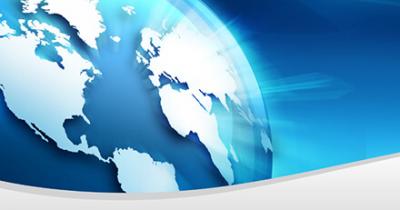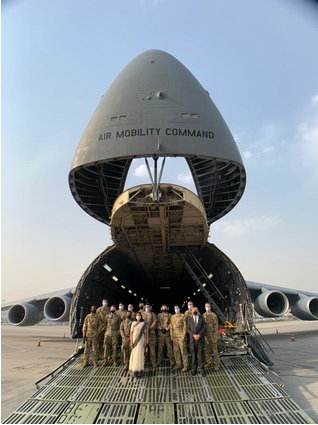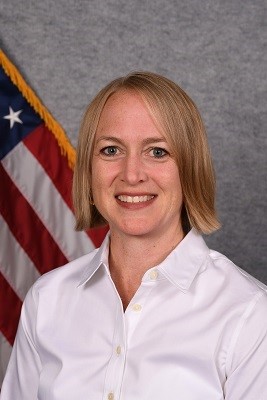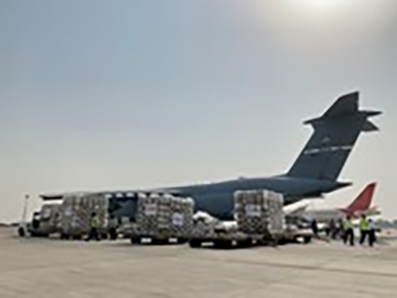Doing the Needful During India's "Second Wave"
FROM A GLOBAL PERSPECTIVE
By Sarah McMullen
August 10, 2021
“Doing the needful.”
When people in India use that expression, they mean they trust someone to pitch in to perform a task, to do “what is necessary,” without instruction.
FDA staff had never heard the phrase before arriving at the FDA’s India Office (INO) in New Delhi, but they soon adopted the expression as well. More importantly, “doing the needful,” came to define INO’s communal all-hands-on-deck approach to the challenges of the COVID-19 epidemic.
Staff who work in an U.S. embassy are expected to perform “other duties as assigned” outside of their normal areas of expertise, if requested by the Chief of Mission, aka, the U.S. Ambassador. That can mean serving as the after-hours duty officer or briefing officials. But during emergencies, “other duties as assigned” can be anything, and at critical times during the COVID-19 pandemic, INO staff have been “doing the needful” on a daily basis to protect Americans and achieve global public health outcomes.
Early last year, during the initial outbreak of COVID-19 in India, FDA staff assisted with repatriation efforts of stranded American citizens looking to leave India after the suspension of commercial flights. Over 6,000 Americans were repatriated to the United States from India. INO leadership also assisted with supply chain issues, working to ensure that many of the critical medical products sourced from India remained available.
At the dawn of 2021, it appeared that India had turned a corner. COVID-19 was a concern, but strict lockdowns initiated in 2020 were working. It seemed that India would be spared the nightmare of COVID-19 that other countries were experiencing. FDA in-country employees began conducting mission-critical inspections in-person – a welcome change from remote record reviews.
INO began planning in-person meetings with Indian counterparts and there was even talk about facilitating workshops in the fall. Then, almost overnight, everything changed.
In the spring of 2021, COVID-19 cases started to rise. The virus was spreading, much quicker than before and hitting harder, and another lock-down was instituted. Employees at the embassy, a tight-knit community of local staff and U.S. employees, suffered as India did: a small number succumbed during the “second wave.”
The whole world (including the U.S.) jumped into action to send aid and assistance. The trickle of U.S. Government (USG) aid turned into a stream facilitated by the United States Agency for International Development (USAID) and efforts of the USG agencies at post, including the FDA. The FDA’s efforts and our relationship with the medical device and pharmaceutical industries and regulators of India proved to be an asset in a time of crisis.
INO, under the leadership of the FDA country director, led the interagency COVID-19 specification task force. This group was charged with determining the needs and specifications of items intended for donation – including medical devices, oxygen, oxygen storage/transport/delivery devices, and other pharmaceuticals.
As of May 2021, seven emergency airlifts had been conducted delivering:
- 20,000 courses of remdesivir (125,000 vials) to help treat critically ill patients.
- Nearly 1,500 oxygen cylinders to address India’s critical oxygen shortage. The cylinders can be repeatedly refilled at local supply centers.
- One million rapid diagnostic tests to quickly identify COVID-19 cases and prevent community spread.
- Nearly 2.5 million N95 masks to protect health care professionals and other frontline workers.
- A large-scale Deployable Oxygen Concentration System that can provide oxygen to treat 20 or more patients at a time.
- 210 pulse oximeters to measure oxygen levels in a patient’s blood to determine whether a higher level of care is needed.
At the request of the Government of India (GOI), the USG (through USAID) provided these urgently needed supplies to the Indian Red Cross Society to ensure they reached those in need as fast as possible. The seven U.S. government shipments were made possible by a USAID-led whole-of-government effort, which included: the Departments of Defense, State, and Health and Human Services (including the Centers for Disease Control and Prevention (CDC) and FDA), as well as Travis Air Force Base, in partnership with the state of California, National Airlines, and United Airlines.
Additional aid efforts were also facilitated. In collaboration with the CDC Foundation, the CDC and the FDA India Office staff supported in-country efforts to identify, source, and fund delivery of 170 large volume, cryogenic liquid oxygen cylinders to three Indian states dealing with a surge of COVID-19 cases.
The FDA’s efforts during this time cannot be understated. Employees worked well beyond regular work hours to identify medical product and oxygen suppliers; answer questions about storage, transport, and other critical specifications; and reach out to GOI counterparts for regulatory information. Employees came to learn much about the technical aspects of many products, including oxygen cylinders and medical oxygen production — from tank thread size to voltage requirements — that were beyond the scope of normal regulatory work.
INO leveraged the agency’s considerable expertise back in the United States to respond to supply chain inquiries, such as the availability of anti-fungal medications to combat secondary infections associated with COVID-19 steroid therapy. All the while, these same employees were concerned for the safety of their family and friends in India, with some suffering from COVID-19 directly.
The combined global aid (including aid from the U.S.) and India’s efforts succeeded. The country turned the corner and gradually emerged from lock-down this summer. It’s not every day that “other duties as assigned” result in lives being saved. In this instance, a greater appreciation for what the FDA does was gained and the satisfaction that, in a crisis, the job mattered, and we made a difference, doing the needful.
Sarah McMullen, Ph.D., is the director of the India Office in the FDA’s Office of Global Policy and Strategy




